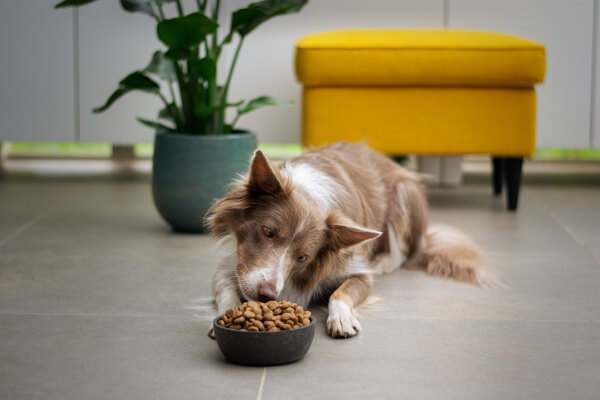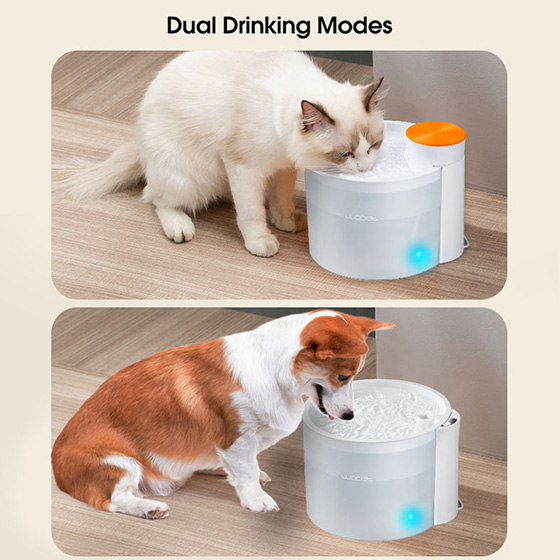-
Home
-
Shop
New -
Explore
-
Support
-
Track Order
May 16, 2023
Author:Lisa Martinez
When your furry companion is sick and has no appetite, it can be challenging to ensure they are getting the necessary nutrition they need to recover. A lack of appetite can quickly lead to dehydration and malnutrition, which can be dangerous for dogs.
In this 2023 guide, we will explore what to feed a sick dog with no appetite and provide practical tips and tricks for feeding a sick dog.
There are many reasons why your dog refuses to eat. It includes medical problems, behavioral issues, environmental stress, separation anxiety, and issues with their diet. Let's have a look at them:
Illness:
A dog's loss of appetite could be due to an underlying illness such as an infection, digestive problems, respiratory infections, or even cancer. If your dog has a fever, vomiting, or diarrhea in addition to their loss of appetite, it's essential to consult a vet immediately.

Certain antibiotics, painkillers, and chemotherapy drugs can be upsetting for your dog's stomach. They can affect your dog's sense of smell or taste, leading to a lack of interest in food.
Any change in environment and routine, whether big or small, can affect your dog’s appetite. They can make your dog feel uncomfortable and induce stress in your pet. A sudden change in their environment includes moving to a new home or having visitors, addition of a new pet in the family, weather changes, or change in feeding schedule or feeding bowls.

Dental problems, such as gum disease, tooth decay, or a broken tooth, can cause your dog pain and discomfort when eating, leading to a loss of appetite. They might not be eating because something in their mouth is causing pain and not letting them swallow properly. If your dog has bad breath, drooling, or pawing at their mouth, it's crucial to have their teeth and gums checked by a vet.

Dogs are social creatures and can experience separation anxiety when separated from their owners for extended periods. This can lead to stress and depression, causing a loss of appetite. An anxious dog waits for the pack to be there to eat. It is important to dedicate quality time to your furry companion and ensure that their needs are being met. To help ease their separation anxiety, try to give them plenty of toys and interactive games as well.
Your dog's lack of appetite could be due to issues with their diet or food. Your dog may refuse to eat if the food has gone stale, is either too hot or too cold, or you might be overfeeding your furry pal. Your dog might be bored with the food because they’re eating the same thing every day for months. Another reason could be that your dog is a picky eater and there is a recent switch in dog food that tastes or smells differently than the old food.

Loss of appetite in dogs should never be ignored. If you're concerned about your dog's lack of appetite, it's crucial to consult a veterinarian to identify the underlying cause and take necessary steps to address the problem.
Dogs can fall ill for a variety of reasons, and one common symptom is a loss of appetite. This can be concerning for pet owners, as dogs need adequate nutrition to maintain their health and recover from illness. If your dog is sick and not eating, there are several foods you can offer to encourage them to eat and provide them with the necessary nutrients.
Bone broth is an excellent option for a sick dog that won't eat. It's a nutrient-dense, easy-to-digest food that can help replenish lost fluids and electrolytes. Feeding bone broth can help provide your dog with the hydration they need to stay healthy and recover from their illness.
Bone broth can also be a good source of protein, which is important for building and repairing tissues. Additionally, bone broth contains gelatin, which can help soothe and heal the digestive tract. Plus, it's easy to make at home. Simply simmer bones and vegetables in water for a few hours, strain, and serve once cooled.
Chicken and rice is a classic meal for a sick dog with no appetite. It's easy to digest, and the bland taste is less likely to cause upset stomachs. Chicken is a good source of protein and can help build and repair tissues, while rice provides carbohydrates and fiber. Boil some chicken breasts and white rice, mix them together, and serve to your dog in small portions. When preparing this meal, it is important to use boneless, skinless chicken breasts and plain white rice.
Pumpkin is an excellent source of fiber, vitamins, and minerals that can help regulate your dog's digestive system. It's also a good option for a sick dog that is constipated or experiencing diarrhea. Mix some canned pumpkin (not pumpkin pie filling) with some chicken broth or water and offer it to your dog. Additionally, pumpkin is low in fat and calories, which can be beneficial for dogs are not very active due to their illness.
Nutritious treats can be a great way to get some calories and nutrients into a sick dog that won't eat. Look for treats that are high in protein, such as boiled chicken or turkey, or high in fat, such as cheese. However, make sure to avoid treats that are high in sugar or salt.
Scrambled eggs are an excellent source of protein, and the texture is easy to eat for a sick dog. Cook some scrambled eggs in a non-stick pan without adding any oil or butter. You can add a small amount of cheese or plain yogurt to make it more appealing to your dog.
One of the best foods to offer a sick dog with no appetite is wet dog food. Wet food has a stronger scent and flavor than dry kibble, which can be more appealing to a dog who is feeling unwell. Additionally, wet dog food has a higher moisture content, which can help keep your dog hydrated.
Sweet potatoes are a good source of dietary fiber, beta-carotene, and several vitamins and minerals including vitamin C, potassium, and iron. They can help regulate digestion, improve immune function, support heart health, and can be a good option for dogs with upset stomachs. Sweet potatoes are also a good alternative to grains for dogs who have allergies or sensitivities to wheat or other grains. They can be cooked and mashed, and mixed with other foods to provide a nutrient-rich meal.
Fish, such as salmon or whitefish, is a good source of protein and omega-3 fatty acids, which reduces inflammation and can be beneficial for dogs with skin or coat issues. Fish such as salmon, sardines, and mackerel are also good sources of vitamin D and selenium, which can help boost the immune system and promote healthy joints. Be sure to choose boneless, skinless fish and avoid any that are high in mercury.
Baby food can be a good option for sick dogs who are not eating, as it is often bland and easy to digest. Look for baby food that is low in sodium and does not contain any onion or garlic.
Oatmeal is a good source of fiber and can help regulate digestion and bowel movements. It is also a good source of protein and contains several vitamins and minerals such as iron, zinc, and vitamin B6. It can also be easily prepared and mixed with other foods to provide a nutritious meal. Feeding oatmeal to dogs can also help them feel full and satisfied.
Additionally, it's crucial to avoid feeding your dog human food that may be toxic to them. This includes chocolate, grapes, onions, garlic, avocado, and anything containing xylitol. Always consult with your veterinarian before feeding your dog anything new, especially if they have any underlying health issues or are on medication.
Water is essential for maintaining your dogs' bodily functions, as dehydration can worsen many health issues. Dehydration is a common problem in sick dogs. When dogs are not feeling well, they may be reluctant to drink water, which can lead to dehydration. Dehydration can lead to constipation, urinary tract infections, kidney and liver problems, and other health issues.
Drinking plenty of water can help flush toxins out of your dogs' bodies. This is particularly important for dogs undergoing treatment for illnesses such as cancer or infections, as these treatments can put a strain on their organs. Drinking water can also help regulate body temperature, lubricate joints, and promote healthy skin and coat.
Encouraging your sick dog to drink enough water can be challenging. We recommend the WOpet dog drinking water fountain as a way to encourage your dog to drink more. This innovative product provides a constant flow of fresh, filtered water that is appealing to dogs. The fountain's design mimics a natural water source, which can encourage dogs to drink more.

Here are some benefits of using WOpet water fountain for sick dogs:

Features
Improved hydration: WOpet water fountain ensures that your dog has access to fresh, clean water at all times, which encourages them to drink more water and stay hydrated. Many dogs prefer to drink from a flowing source of water, such as a stream or a faucet. The WOpet water fountain mimics this flowing water source, which can encourage dogs to drink more water and stay hydrated.
Better health: When dogs are properly hydrated, they have better overall health. Adequate water intake can help with digestion, kidney function, and body temperature regulation, among other things.
Clean water: The WOpet water fountain has a multi-stage filtration system that removes impurities and debris from the water. This ensures that your dog is drinking clean and fresh water at all times, which can help prevent illnesses.
Convenience: With a capacity of 2 liters, the WOpet water fountain requires less frequent refilling than traditional water bowls. It also has a low noise level, making it a convenient choice for pet parents.
When feeding a sick dog, it's essential to offer small, frequent meals throughout the day, rather than one or two large meals. To stimulate your sick dog's appetite, try offering them small amounts of highly palatable and nutrient-rich foods such as bone broth, boiled chicken and rice, scrambled eggs, or canned food that is easy to digest. Avoid giving your dog table scraps as these can be harmful to their digestive system and may decrease their appetite.
The amount you should feed your sick dog depends on their size, weight, and health condition. It is best to consult with your veterinarian to determine the appropriate amount of food to feed your sick dog. In general, small and frequent meals throughout the day may be more suitable for a sick dog than large meals. If your dog has a reduced appetite, it may be necessary to adjust their portions accordingly. Overfeeding your sick dog can lead to digestive issues and further health complications, so it is important to feed them the appropriate amount for their needs.
The timing of feeding your sick dog will also depend on their health condition and any medications they may be taking. Some medications should be given with food, while others should be given on an empty stomach. Again, it is best to consult with your veterinarian for specific instructions on when and how to feed your sick dog.
Popular Post
Copyright © 2024 WOPET. All Rights Reserved.